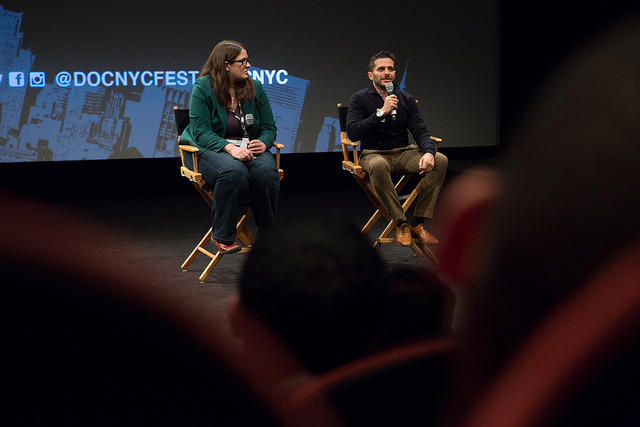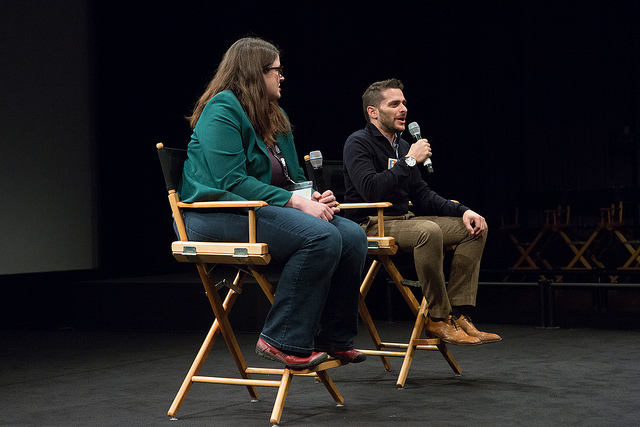Off the Rails Poses Question of Obsession and Accountability Adam Irving's doc dives into the mind of serial transit thief Darius McCollum


Written by Kate Hoos
Off The Rails, the first film by director Adam Irving, made its NYC debut this Saturday at DOC NYC. It is a look into the life of the notorious “train in the neck” Darius McCollum, a New York City man who has a lengthy rap sheet of offenses stemming from a seemingly uncontrollable compulsion to steal and operate mass transit vehicles over a span of thirty five years. What may at first glance seem to be a story about a man who REALLY likes trains, we see a larger narrative about a man lost in a world that doesn’t understand him, and that is not doing much to help him.
McCollum may appear as an addict to some, a man with no self control, a grandiose and selfish man who even left his wife over his love of trains. But the reality is he is a man who has been diagnosed with Asperger’s Syndrome, a high functioning disorder on the Autism Spectrum. Due to this, and the need for people with AS for ritual and routine, as well as intense, almost obsessive interest in one subject, it is not hard to see his fixation on the schedules and precise movements of mass transit. Since Asperger’s was not recognized in the DSM until the early 1990s, it is unclear when exactly McCollum was diagnosed (he was born in 1965) but it is likely that it was well into his cycle of incarceration and recidivism. His lawyer Sally Butler speaks in the film to grossly inadequate care in a system that “doesn’t know how to handle him”
A vicious assault at the age of twelve in which he was stabbed in the back with scissors by another child, caused McCollum to become very distrustful of other children, retreating into his own world. As a result he was institutionalized and given heavy doses of drugs to help him cope. After being released, he escalated his fascination of trains and further escaped to the underground world of the subway, saying in the film that he “felt protected” and that it was like his own “sanctuary.” He retells the story of befriending MTA employees and being given tasks and small jobs to complete, and the feeling of satisfaction and of being needed that it brought him. He learned to operate a train in 1978- at age 13- and was on his way to his first “heist” in 1981, when he successfully operated a downtown E train, making all scheduled stops and announcements along the way. He was quickly caught in the act and arrested, receiving a slew of media attention in the process.
It is hard to know if this is the incident that sparked his long list of theft of mass transit vehicles, ranging from the subway and busses, to trains on the Metro North and Long Island Rail Road. One could argue it was not this, but rather the MTA rejecting his employment application when he was seventeen and then again at age eighteen. Seen as a liability and an embarrassment, the MTA would not take the risk on employing McCollum. Not to be dissauded from his passion for trains, he continued to operate them, seemingly at will, and in between stints in prison, for the next three decades. Had the MTA given him a chance to prove himself a knowledgeable and meaningful employee, which many of his advocates assert, he would have been a productive member of society rather than a sad case of a man not able to connect and not able to resist his compulsions, stuck in an endless cycle of imprisonment.
We seem to see McCollum finally ready to change his ways, he states “I’ve done a great job of impersonating other people, it’s for for me to be myself” as he settles into life in a rural area of North Carolina with his ailing mother in late 2015. It is an almost hopeful moment until we flash three months ahead to McCollum back in New York, being picked up in Gowanus, Brooklyn for the theft of a Greyhound bus. He is remanded back to Riker’s Island and is facing a 15 year to life prison sentence as the film concludes, and while questions of security whether McCollum truly committed a crime if no one got hurt does come up, the final question the film poses is one of accountability.
Kate Hoos is a musician, writer, freelance photographer, and social media consultant whose work has appeared in Bust, Tom Tom Magazine, Homoground, and on countless band websites. She is a member of the organizing committee for the Punk Island Festival and plays guitar in the band Lady Bizness.




